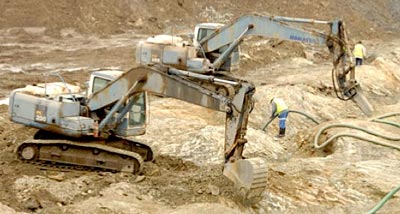
Mining supports economy in 2020, despite recording negative growth – report

Despite mining being one of the few sectors that supported the economy in 2020, the industry recorded a negative growth rate of 14.5%, Chamber of Mines President, Zebra Kasete said at the institute’s 42nd Annual General Meeting this week.
Apart from Namib Lead and Zinc mine, there were thus no other retrenchments that occurred as a result of the pandemic, Kasete said in his mining industry review for 2020.
“Initial growth projections for the mining industry in 2020 stood at 11.1%. However, the preliminary National Accounts released by the Namibia Statistics Agency show that the industry recorded a negative growth rate of 14.5%. This was a further contraction from the negative growth rate of 9.5% posted in 2019,” he said.
According to Kasete, growth of the mining sector was negatively impacted by reduced diamond mining output, uranium and metal ore production.
“Uranium production was negatively impacted by the pandemic and water supply disruptions in the first quarter of 2020. Base metals output recorded a strong contraction due to a sharp drop in the production of Special High-Grade Zinc, owing to the closure of Skopion Zinc mine,” he added.
Kasete said in total, the industry directly employed 14,435 individuals in 2020, a 12% drop in the number of permanent jobs compared to 2019.
“The loss of jobs was largely due to the closure of the Skorpion Zinc mine as detailed in this report. The direct employment consisted of 8,361 permanent employees, 902 temporary employees and 5,172 contractors. Applying a conservative mining multiplier of seven, the mining industry created 101,045 jobs, which is a sizeable portion of Namibia’s workforce. Every job created by the industry also generates an important source of revenue for Government through PAYE and VAT as a consumption tax,” he added.
In 2020, employees from mining companies paid a recorded N$1.246 billion in PAYE.
Approximately 96% of the mining workforce employed in 2020 were Namibians, and the majority of the wages and salaries bill, amounting to N$6.058 billion, circulated within, and benefitted the local economy. Moreover, the industry maintained its high local expenditure component which amounted to N$12,305 billion, he added.
Meanwhile Kasete noted that the improved profitability of the mining industry increased the total contribution to government by 28 %, which amounted to N$4.113 billion in 2020.
“This was largely an outcome of the favourable gold price in 2020. Corporate taxes increased by 54 %, totalling N$2.208 billion, owing to the boosted profitability of Namibia’s gold mines. Royalties and export levies dropped by 3 and 4 % respectively due to the lower output and commodity prices for most mineral commodities. Chamber members collectively paid N$1.672 billion in royalties and N$233 million in export levies.,” he said.
In terms of exploration expenditure by exploration companies, as captured in the Chamber’s annual survey, Kasete said it increased by 55% in 2020, from N$171 million in 2019 to N$264.5 million. “Again, the high price of gold, and rising prices for industrial minerals later in the year, resulted in higher levels of exploration activity. The actual figure is likely to be much higher as not all exploration companies are members of the Chamber and covered in the survey. Exploration by mining companies decreased by 12%,’ he said.
After two years of declining investment by Namibian mines, Chamber members collectively posted an increase of 43% of Gross Fixed Capital Formation in 2020, totalling N$4.83 billion. Investment was driven by the construction of Debmarine’s new AMV3, open pit development and underground mine development at the Otjikoto gold mine, he concluded.










































